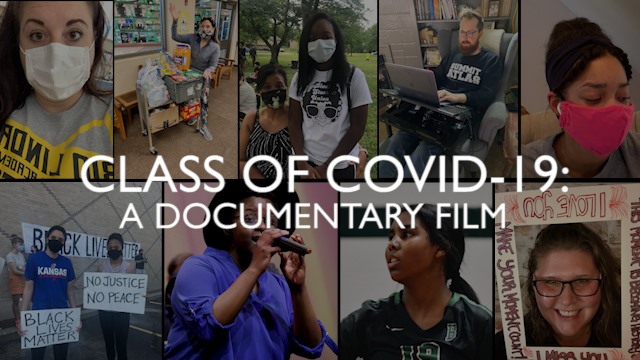What do you do if you’re planning to make a documentary about teaching history in an age of disinformation, but history itself takes a big turn?
If you’re Donna Davis, Ph.D., a professor in the UMKC School of Education, you go with the more urgent story: How are the students, teachers and parents of the “Class of COVID-19” reacting to their new reality?
“This was supposed to be a small research project,” Davis said, “interviewing maybe four or five teachers about what it means to teach U.S. history with Twitter, Instagram, TikTok and other streams of information constantly feeding into their students’ worlds. I wanted to know how these teachers helped students understand what is fact and what is fiction.
“When the pandemic hit, it was clear that the film needed to adapt, adjust and make room for additional conversations.”
Fortunately, Davis already had Kansas City filmmaker Jon Brick on board. Davis’ work on the historical and social foundations of education typically appears in scholarly journals and books, but she thought filmed interviews would bring her new project to life.
“You’ll see both students and teachers express their real outrage about so much of what is happening.”
Brick’s credits include documentaries, original online video, and film and social media content for clients including Yahoo! News, People, Oracle, Getty Film and “60 Minutes.” Most relevant to Davis’s project was Brick’s 2018 documentary, “Uncommon Allies,” which told the extraordinary story of Rosilyn Temple, a Kansas City woman who responded to her son’s murder in 2011 by becoming an activist for reducing violence and improving police-community relations.
“Jon’s commitment to telling stories that are founded in social justice was important,” Davis said. “And his background in working closely with the Kansas City Police Department and community members on “Uncommon Allies” made this transition very smooth. We were able to ask very difficult questions of our interview subjects, and they were so very open and willing to share. You’ll see both students and teachers express their real outrage about so much of what is happening.”
Now, they have done more than 60 interviews, with more in store as schools and families continue to adapt to the pandemic, the explosion of protests over shootings by police, and other developments.
“This is an unfolding story, and the end hasn’t been written yet, unfortunately,” Davis said. “We continue to collect stories and get a look at just how devastating this has been for so many people.”
Davis said she already had learned how much people want to tell their stories and be heard, how powerful the stories of young people are, and how much they want social justice and social change.
“This is the Class of COVID-19, all of the participants on a terrible journey who took the time to share their lives with us.”
Though they are staying flexible, Davis and Brick currently are hoping to produce a one-hour documentary by next summer or fall.
“As we thought about it, we wanted to capture the initial reaction to the pandemic, the various touch-points along the way, and then, hopefully, a look at the resolution of this nightmare, when a vaccine or solid treatment is in place,” Davis said. “This is the Class of COVID-19—all of the participants on a terrible journey who took the time to share their lives with us.”
As for distribution, Brick said, “We’ll submit the film to a number of film festivals as a feature documentary. We’ll work with some distribution partners to get the film out on streaming services such as Netflix, and possibly PBS or other television outlets. We also will do a social impact campaign and use the film for educational purposes.”
Davis and Brick are working with the International Documentary Association to gain fiscal sponsorship and 501c3 status, allowing foundations to contribute to the production of the film. They also have a crowdsourcing campaign underway with Indiegogo where anyone can support the project.
“People need to know that this is a project designed to illuminate the voices of the pandemic and all that took place during this awful time,” Davis said. “We don’t purport to have all the answers, but the questions are very clear and the emotion is raw.”

